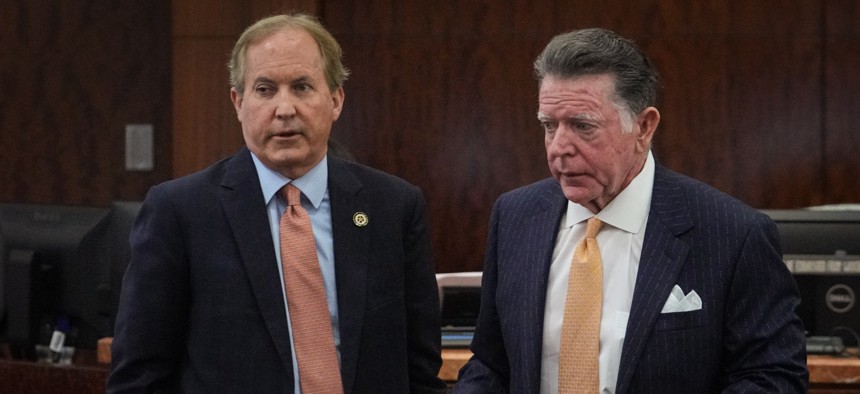Supreme Court upholds Texas online age verification law

Texas Attorney General Ken Paxton (left) at a previous event. Paxton defended the state's age verification law in the Supreme Court and prevailed last week. Houston Chronicle/Hearst Newspapers via Getty Images
Justices said a state law requiring adult entertainment sites to verify users’ ages is constitutional.
The Supreme Court ruled 6-3 on Friday that a Texas law requiring pornographic websites to verify users’ ages is constitutional, in a case that was closely watched by many other states.
The majority rejected the argument that age verification technology places an undue burden on visitors to adult entertainment websites, and restricts their First Amendment right to access all manner of information and content.
Instead, the Justices found that the age verification requirement, which requires adults to state their age but can vary in terms of the documentation or methods required, “only incidentally burdens the protected speech of adults,” according to the court’s ruling.
“Age-verification laws like [this one in Texas] fall within States’ authority to shield children from sexually explicit content,” Justice Clarence Thomas wrote on behalf of the majority. “The First Amendment leaves undisturbed States’ traditional power to prevent minors from accessing speech that is obscene from their perspective.”
Thomas was joined in the majority by fellow conservatives: Chief Justice John Roberts, as well as Justices Samuel Alito, Neil Gorsuch, Brett Kavanaugh and Amy Coney Barrett. Justices Elena Kagan, Sonia Sotomayor and Ketanji Brown Jackson, the Court’s liberal wing, dissented.
Gov. Greg Abbott signed the bill into law in 2023, amid a wide push among many states to restrict minors’ access to adult entertainment websites and require users to verify their ages. Louisiana was the first to have such a law come into effect in January 2023. Since then, The Age Verification Providers Association, which represents age verification tech providers, estimates that 24 states have passed similar legislation.
A district court had struck down the Texas law, which required age verification for any websites that have at least one third of their content deemed harmful to minors, but the U.S. Court of Appeals for the Fifth Circuit reversed that ruling and upheld the law while striking down a mandate that adult websites post health warnings about pornography. In response to this and other laws, pornographic and other websites have pulled out of various states.
A lawsuit against the law brought by the Free Speech Coalition, the trade group that represents the adult entertainment industry, had argued that the legislation was an undue burden and should be subject to strict scrutiny, a high legal standard where courts determine whether actions infringe on fundamental rights like free speech. The Court’s majority rejected that view, and said that it is harder for websites to guess users’ ages, so they must be free to do so.
“Adults have the right to access speech that is obscene only to minors,” Thomas wrote for the majority. “And, submitting to age verification is a burden on the exercise of that right. But, adults have no First Amendment right to avoid age verification, and the statute can readily be understood as an effort to restrict minors’ access. Any burden experienced by adults is therefore only incidental to the statute’s regulation of activity that is not protected by the First Amendment. That fact makes intermediate scrutiny the appropriate standard under our precedents.”
In her dissenting opinion, Kagan said the majority’s argument in favor of the Texas law is “confused” and “at war with itself.” She said that, based on precedent, the First Amendment “prevents making speech hard, as well as banning it outright,” so this law should not have been allowed to stand.
“The majority is not shy about why it has adopted these special-for-the-occasion, difficult-to-decipher rules,” Kagan wrote. “It thinks they are needed to get to what it considers the right result: giving Texas permission to enforce its statute. But Texas should not receive that permission if it can achieve its goal as to minors while interfering less with the speech choices of adults. And if it cannot, then Texas’s statute would survive strict scrutiny, given the obvious importance of its goal.”
In the aftermath of the decision, opponents of the law warned that it would further erode Americans’ free speech rights.
“As it has been throughout history, pornography is once again the canary in the coal mine of free expression,” Alison Boden, executive director of the Free Speech Coalition, said in a statement released by the American Civil Liberties Union, which represented it. “The government should not have the right to demand that we sacrifice our privacy and security to use the internet. This law has failed to keep minors away from sexual content yet continues to have a massive chilling effect on adults. The outcome is disastrous for Texans and for anyone who cares about freedom of speech and privacy online.”
Iain Corby, AVPA’s executive director, said in a statement that the Court’s ruling showed that age verification is “now a proven tool to help protect children from harmful online content.”
And Texas Attorney General Ken Paxton, who defended the law, hailed the decision as a “major win.”
“This is a major victory for children, parents and the ability of states to protect minors from the damaging effects of online pornography,” Paxton wrote in a post on X, formerly Twitter. “Companies have no right to expose children to pornography and must institute reasonable age verification measures. I will continue to enforce the law against any organization that refuses to take the necessary steps to protect minors from explicit materials."






